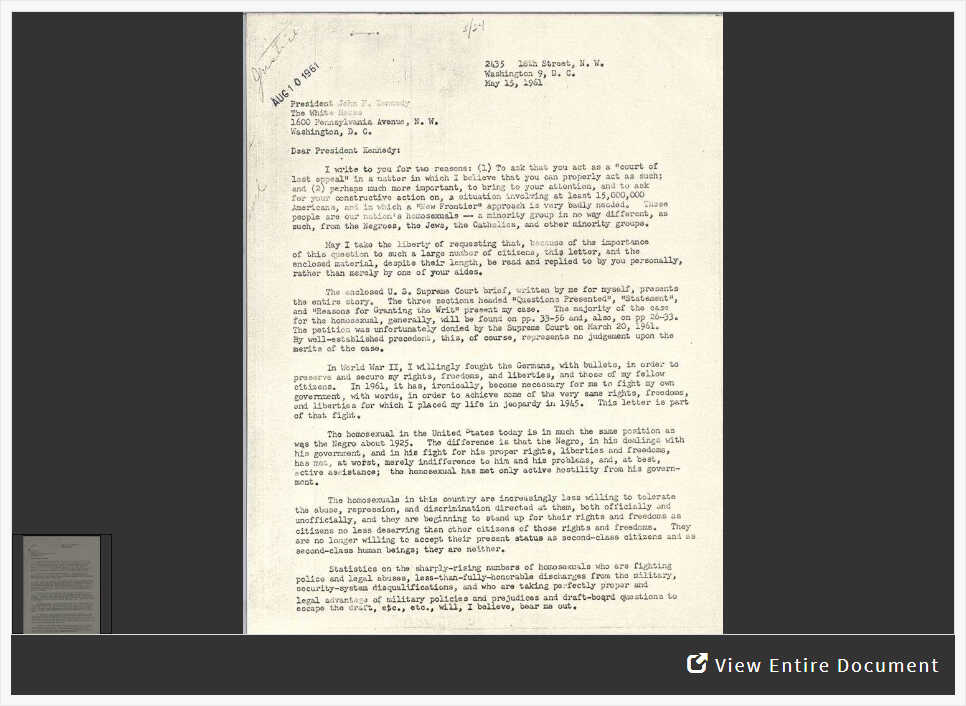In this activity, students will read a 1961 letter from Dr. Franklin Kameny to President John Kennedy. Kameny is recognized today as a leader in the gay rights movement. In this letter he outlined four areas where action by the Federal government was needed, and a fifth general issue for change. As part of their document analysis, students are asked to identify the five areas of change, and then as a follow-up, to reflect on what and how the issues Kameny identified have changed in the past 50-plus years, and what LGBTQ+ civil rights issues are being discussed today.
Suggested Teaching Instructions
This letter fits into units about the civil rights movements of the 1960s, or as part of a unit specifically discussing LGBTQ+ (LGBT, LGBTQIA) history. For grades 8-12. Approximate time needed is 25 minutes.
Note: Students will see commonly used words from the 1960s in the letter: "homosexual" and "Negro" – rather than today's more acceptable terms "gay" and "Black." This is explained in the activity's instructions, but historical terminology and changes in language over time may be something you want to discuss with students either before or after the activity.
Ask students to begin the activity individually or working in pairs. They should answer the questions below the letter, which will guide them through the process of written document analysis. If necessary, check in with your students at each step in the process and model analysis if required:
- Meet the document.
- Observe its parts.
- Try to make sense of it.
- Use it as historical evidence.
As part of the letter, Frank Kameny outlined five areas where change was needed to address civil rights for gay Americans. The first four are action items for the Federal government and call for change in policies and practices in:
- laws
- Federal employment
- the military
- security clearances for government employment
The fifth issue is a more general one, Kameny acknowledged, but still very important: education of the public.
Each of the first four issues Kameny outlined was an area in which there was official discrimination against LGBTQ+ people.
After students have analyzed the document and identified the issues, they should click on "When You're Done." Facilitate a full-class discussion based on the questions provided:
- Have the five issues that Dr. Kameny listed in his letter been addressed and changed in the several decades since this letter was written?
- If so, how have those issues changed?
- What words would you use to describe the changes?
- How were the changes accomplished? Are there ongoing or other issues about LGBTQ+ civil rights being discussed today?
Discuss the type and amount of change in the past 50-plus years, how the changes to Federal policy and law came about, and who was involved in the arduous path to expand civil rights for LGBTQ+ people.
You may wish to provide students with the following brief background information following the activity:
Frank Kameny was a World War II veteran who obtained his PhD in astronomy from Harvard University. He began working for the Army Map service but was forced to resign in 1957 because of his sexual orientation. This happened during a time known as the Lavender Scare, when thousands of gay employees were fired or forced to resign from the Federal workforce because of their sexuality. Kameny appealed his firing all the way to the Supreme Court, but was ultimately unsuccessful. He then founded the Mattachine Society in Washington, DC, which battled anti-gay discrimination, particularly in the Federal government.
In 1975, the Civil Service Commission announced new rules stipulating that gay people could no longer be barred or fired from Federal employment because of their sexuality.
As an alternate extension activity, you can divide the class into small groups and assign each group to identify the history and background of a specific issue up to 1961, and what has changed since that time. The groups could then present to their classmates the results of their further research.





